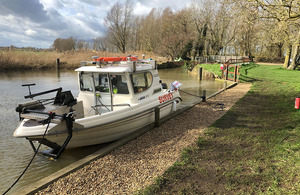Fraudulent presidential election in Belarus: Joint statement to the OSCE
Mr Chair,
I am delivering this statement on behalf of Albania, Iceland, Moldova, Norway, Ukraine, the United Kingdom and my own country Canada, who wish to add their voices to those marking the two-year anniversary of the deeply flawed and fraudulent presidential election in Belarus. The Moscow Mechanism report in 2020 and UN Special Rapporteur’s investigations have found compelling evidence of a campaign of severe repression across all parts of Belarusian society which took place before, during and after the August 2020 Presidential Election.
The 2020 Moscow Mechanism report described “overwhelming evidence that the presidential elections of 9 August 2020 have been falsified and that massive and systematic human rights violations have been committed by the Belarusian security forces in response to peaceful protests and demonstrations.”
The report made 65 recommendations to the Belarusian authorities, including new Presidential elections, an immediate end to the violence and release of all those illegally detained, an independent oversight mechanism on detention conditions, and an investigation into all allegations of torture.
However, two years on, civil society has been decimated and independent media quashed. Belarusian people have faced arbitrary arrest and detention – with over 1,300 political prisoners now detained, steadily growing in number since 2020. There are credible reports that some detainees have been subjected to torture. The regime has pursued politically motivated, unfair trials, has extended the use of the death penalty to include ‘attempted’ acts of terrorism, has prevented Belarusians from leaving the country, has undertaken trials in absentia, and failed to meet international standards when conducting a constitutional referendum.
The Belarusian authorities have had ample opportunity to end their attacks on the freedoms of their citizens, to release those detained on spurious political charges, and to undertake the fresh elections needed to enable the Belarusian people to decide their own leaders and their own future. Recommendations and evidence of wrongdoing from the UN Special Rapporteur, from the OSCE Moscow Mechanism, the International Civil Aviation Organisation (ICAO) and the International Labour Organisation’s (ILO) Commission of Inquiry have been consistently ignored by the regime.
Instead, two years on from the fraudulent elections, the regime now seeks to curtail the freedoms of the people of neighbouring Ukraine through facilitating Russia’s illegal invasion of their country. This support to Russia’s provided by the Lukashenko regime has served as an excuse to racket up repression on those Belarusians standing up against the war.
We will continue to hold the Lukashenko regime to account for their human rights violations and continued support to Russia’s illegal war. This includes through targeted sanctions packages and support for accountability measures. It is a false narrative that sanctions are provoking a global food crisis. It is, in fact, Russia’s illegal invasion of Ukraine that impacts upon global food security. Firm action must be taken to deter the Lukashenko regime from their violations of the human rights and fundamental freedoms of Belarusian people, and its reckless support of Russia’s illegal invasion.
We continue to stand in solidarity with the Belarusian people, condemn the regime’s continued human rights violations, and strongly urge the Belarusian authorities to release all political prisoners, immediately and unconditionally.
In conclusion, Mr Chair, we again urge decision-makers in Belarus to reconsider their current course of action, to cease their support of Russia’s illegal invasion of Ukraine, and to seek to proactively address the recommendations made in the Moscow Mechanism report.
We stand committed and ready to support the democratic rights of the Belarusian people – genuine and inclusive dialogue is the bedrock to democracy – and we invite Belarusian authorities to engage with the Belarusian people.

